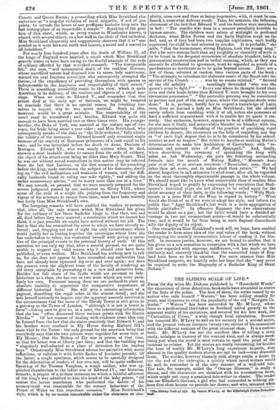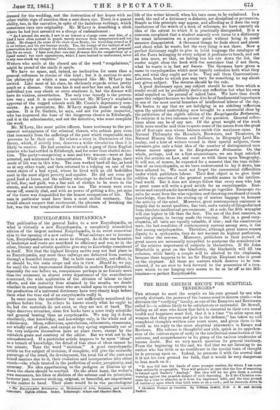THE SLIDING SCALE OF LIFE.•
FROM the day when Mr. Dickens published in "Household Words" the 'experience of three deteetives,bookstalls have abounded in stories of the feats of the police. The best of them, the series issued by an author who calls himself " Waters," has been selling steadily for years, and threatens to rival the popularity of the old " Newgate Ca- lendar." "Waters" has been succeeded by Mr. lisPLevy, whose fame as a professional thief-taker in Scotland added greatly to the apparent reality of his narratives, and secured for his first work, the "Curiosities of Crime," a wide though local circulation. Success has tempted Mr. M'Levy to call on his memory for a second series, and the present volume contains twenty-two stories of his encounters with the different sections of the great criminal class. It is a curious book. Mr. MLevy has not the smallest idea of telling a story easily, indulges in humour of •the weakest kind, and is always mora- lizing just when the moral is most certain to spoil the point of the incident he relates. Yet the stories are really interesting, for besides the tone of reality Mr. hi'Levy's long experience imparts, they abound in the quality modern stories are apt to lack—true dramatic force. The stories, however clumsily told, always excite .a desire to see the end of the imbroglio, a quality which novel writers would do well to remember is of the very essence of a well-told tale. The tale, for example, called the " Orange Blossom," is really a drama, and the .characters are sketched with an unconscious force, which might put many a practised tale-writer to shame. The reader can see Elizabeth Gorman, a girl who had succeeded in robbing six-
dressed for the wedding, met the destruction of her hopes with no other visible sign of emotion than a cast-down eye. There is a quaint ability, too, in the narrative, in spite of the ludicrous verbiage, which sometimes rises into originality. Mr. M‘Levy is describing a clerk whom he had just arrested on a charge of embezzlement :
As I uttered the words, I saw in an instant a change come over him, of a kind I have often noticed in people merely nervous from temperament and not drink. He clasped the arms of the chair more firmly, his trembling ceased as if in an instant, and his eye became steady. Yes, the energy of the instinct of self- preservation shot up through the drink-fever, confirmed his nerves, and prepared him for an onset. I have seen fear run into firmness like the congelations of a liquid metal; but such appearances, which I have learned to understand, never in any case shook my suspicions."
Writers who smile at the absurd use of the word " congelations," might be proud of the simile it spoils.
We have no space, and, indeed, no inclination for more than a general reference to stories of this kind ; but it is curious to note the philosophy at which a man employed like Mr. Mlevy has arrived. Like most of his class, he obviously regards crime pretty much as a disease. One man has it and another has not, and in the individual you may check or even eradicate it, but the disease will, have its victims, nevertheless. The only true remedy is the preven- tive one ; and it is curious to contrast Mr. M‘Levy's emphatic approval of the ragged schools with Mr. Cumin's deprecatory com ments. As a preventive, Mr. AlLevy regards himself as simply, useless. It is Dr. Guthrie, he says, and not the police inspector, who has improved the tone of the dangerous classes in Edinburgh, and it is the schoolmaster, and not the detective, who must complete the work.
Mr. M‘Levy, like most police officers, bears testimony to the per- manent unhappiness of the criminal classes, who seldom gain even that immunity from the sufferings of the poor which respectable men, presume to be their end. He relates a story in illustration of this theory, which, if strictly true, deserves a wider circulation than it is likely to receive. He had occasion to attack a gang of three English coiners who had settled in Edinburgh, and for some time eluded detec- tion. The party—comprising a man and two women—were at last arrested, and sentenced to transportation. While still at large, their mode of life was in this wise. The man worked hard ill day, as hard as at any other trade, and then returned to a lodging on one of the worst stairs of a bad wynd, where he lived with an old bedridden aunt in the most abject poverty and squalor. He did not even get good food at home, and the solitary advantage he derived from a life of toil, fear, and guilt, was a fine suit of clothes to be worn in the streets, and an occasional dinner in an inn. The women were even worse off, scantily clad, and with no power of getting a fire, yet none of the three was disqualified for the honest occupations of life. The man in particular must have been a most skilful mechanic. One would almost suspect that excitement, the pleasure of breaking the law, was the true temptation of the criminal class.































 Previous page
Previous page